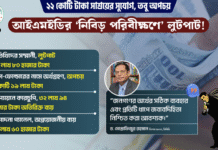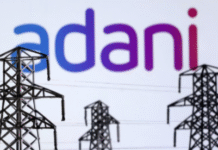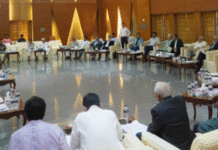Are we fine with the fine?

Desperate times require desperate measures. The Road Transport Act 2018 was endorsed by the Cabinet Division on August 6, 2018 on the heels of the nationwide student protest that sparked off when two college students were killed by a speeding bus last year on July 29. The law was passed in parliament on September 19 and approved by the President on October 9, 2018. The government, however, deferred the implementation schedule, and only on October 23, 2019—almost a year after the passing of the law—Bangladesh Road Transport and Highways Division issued a gazette notification announcing that the law would go into effect on November 1.
As Dhakaite road-crawlers, we are suddenly waking up to the exuberant fine fear aired by the megaphones of our traffic officials. A new law is in town to discipline the unruly traffic system. And the figures are staggering. Already, the overwhelming suspicion is, the steep penalties will lead to corruption and overburden the citizens. In many cases, the punishment is not in proportion to the severity of the crime and defies the principle of proportional justice. For instance, the “voluntary” murder clause in case of accident-related death gives a faulty driver the benefit of the doubt; whereas, for jaywalking the maximum fine for a pedestrian has been set at Tk. 10,000. So a reckless driver can get away with a murderous act, while a day labourer can be charged his entire month’s salary for crossing the road outside the designated zone.
The 1983 Act, which has been replaced by the new one, had minor offences set at Tk 200-300 range. Now the same actions would demand hefty fines amounting to Tk 10, 000 to 25,000 range. Driving without fitness or registration would incur a fine of TK 25,000, and fake license would cost the perpetrator Tk 1-5 lakh or 6 months to 2 years in jail. The hike in many instances is more than 100 times. Does the growth in our national income correspond with the steep rise? Or does the state intelligence consider us all to be casino owners?
Of course, the fines are meant to act as deterrents. But as citizens, we are getting the short end of the bargain. If you ask me, there is too much stick, and not enough carrots! Someone posted on Facebook: “Roads of Africa. Fines of America.” Without implicating the friendly continents, we can find some truth in the statement. Is the service worth the tax that we pay? What are the faults in the infrastructure that encourage violation of laws? Have we created a system, a transport network that allows efficient movement of traffic? What about the culture of impunity in which everyone thinks law can be hoodwinked? Do we have the ethical values to respect the boundary of others while driving or travelling? Do we have the minimum courtesy for our fellow travellers? Then there are the men of law who champion unlawfulness.
In every junction, you will notice a tag team performance by our traffic constables and traffic sergeants. The constable would randomly stop a car or pickup and bring it to the sergeant for processing the fine and go back to his post. Any streetwise person will tell you that most public transport outfits keep many of these men on the payroll. Any avid spectator will notice the exchange of slips. Bribery, albeit extortions, are rampant among our traffic system. Hence a public bus company that has the police in its good book will dare to stop in the middle of the road, waylaying all other vehicles and pick up passengers while blocking its rival bus from overtaking it. Yet the person in charge will turn away and catch a small fry and go after a helmetless biker, ignoring the bizarre bus blockade. Will it be possible for the police force to come out of the alleged unholy alliances that allow the buses to bully? I suspect not. Because individual greed cannot be satiated as long as the fine amounts fatten the State purse. Sharing the booty in the commission will enhance the evil practice further.
The second reason why this hefty tax is unjust involves the traffic flow of the city. Dhaka has the most sophisticated signal system, which I heard was brought from Australia. Yet the traffic is managed manually. According to traffic flow theory, having 185–250 vehicles per mile per lane causes complete stops of traffic as we reach “Jam density.” Having 67 vehicles per mile per lane is known for causing “breakdown” condition. Once the mass flow rate (or flux) exceeds the optimum density (above 30 vehicles per mile), traffic flow becomes unstable, and even a minor incident can result in persistent stop-and-go driving conditions. Our GPS red grids are constant reminders of such conditions in Dhaka. So we have a system where signals don’t work. Cars are stuck on zebra crossings. We don’t have enough bus bays. We don’t have sidewalks for pedestrians to walk. There is hardly enough parking for all the cars that ply on the streets. The public transport system is pitiable to say the least. Taxis do not run on meters. Buses do not run on time. And slow moving rickshaws paddle in the fast lane. BRTA cannot monitor license giving system and train the drivers. The long and short of it: there is no traffic management system.
Creating a system that will excite a fine frenzy is very unlikely to help the cause. Those who levy the fines must earn the respect of the city dwellers. If our officers behave like uniformed goons, then the tendency would be to compromise. Unfortunately, we have grown accustomed to a system in which we see flag-bearing cars coming from the wrong sides; ambulances screaming at the top of their horns while traffic law enforcers pick their noses; signal lights changing while some officers are negotiating the deals. Implementing the fine structure will require a change in our mind-set.
It’s good to hear that all police officers will have cameras installed in their uniforms. Maybe as citizens we need to carry cameras too so that we can present our side of the stories. The hand of law is certainly long, and if it decides on looking for loopholes it sure is supposed to get one. Conversely, if we want to find faults in the system that is implicating us, we too can notice many anomalies. One difference between those who punish us and those of us who will be punished involves the fault in the stars. The stars they wear in their dresses wreak power, and our stars are as paradoxical as eating halwa-rooti hoping for a changed plight.
Of course there are genuine offenders who deserve genuine punishments, if not more. For the rest, are we fine with the fines?
Shamsad Mortuza is Professor of English, University of Dhaka. Currently, on leave, he is Pro-Vice-Chancellor of ULAB. Email: shamsad71@hotmail.com









